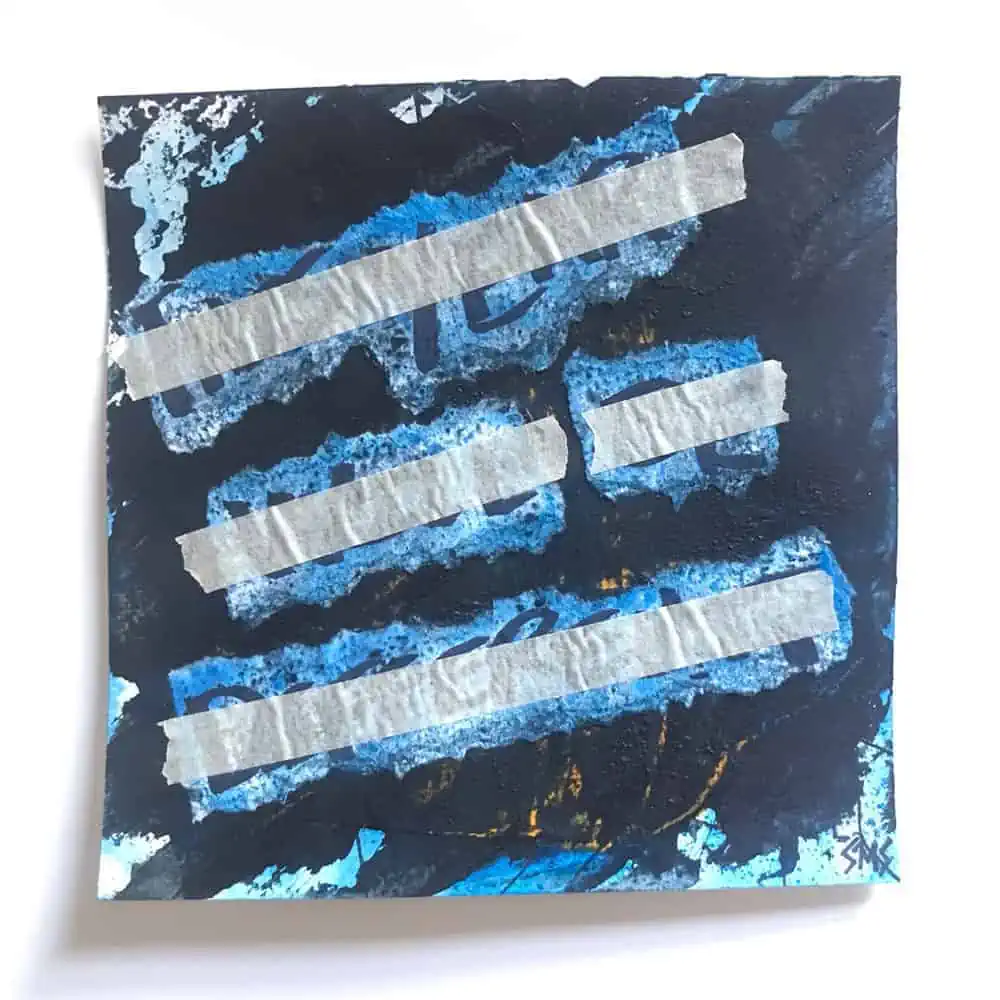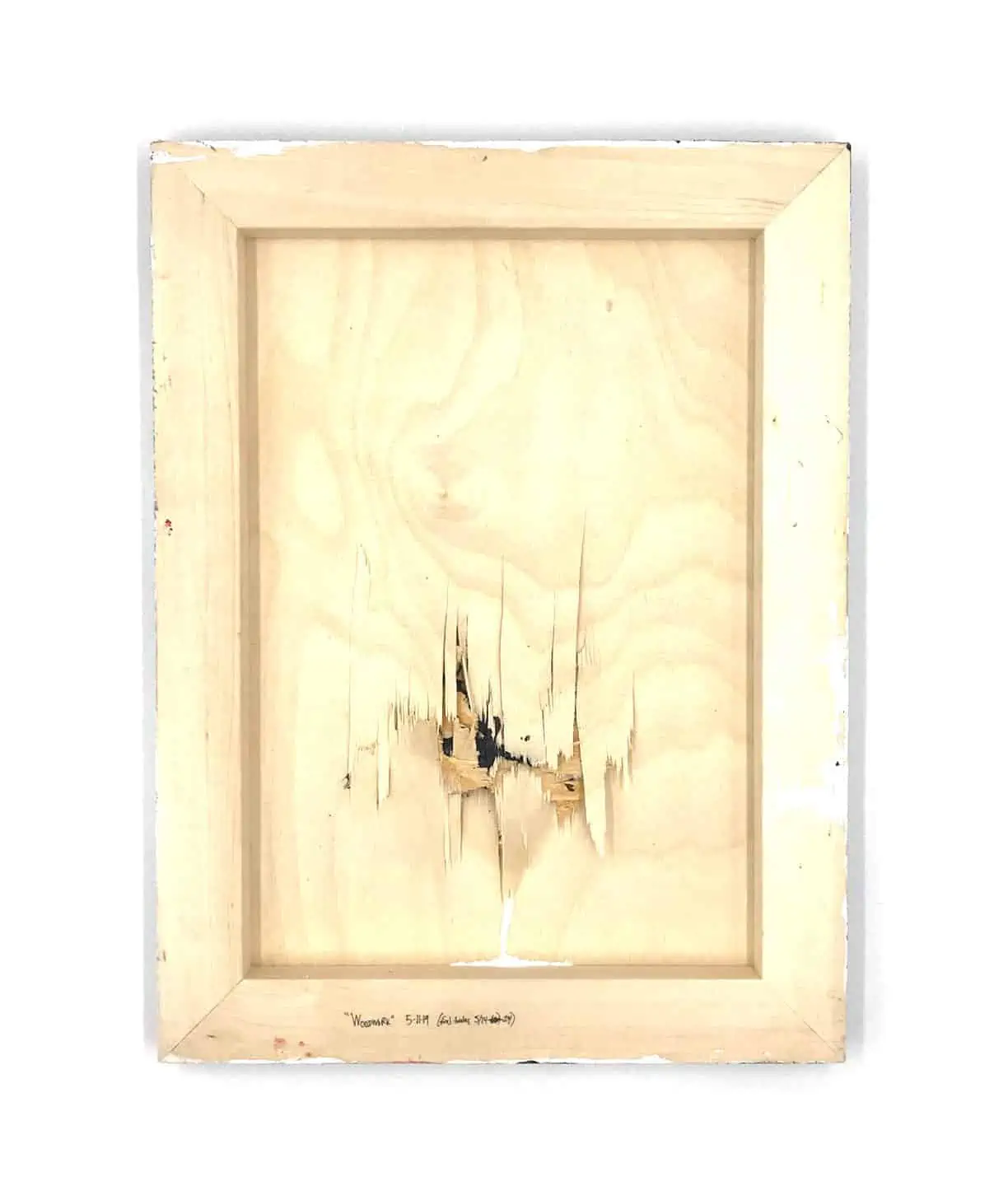January 16, 2021
Painting Observations
resilience isn’t the result of a negative experience; it’s a result of working through its aftermath.
This essay is Day 43 of The 100 Day Project, where I’m creating #100daysofartandessays based on the Word of the Day.
Word of the Day (May 19, 2020)
indemnity noun
- compensation for damage or loss sustained.
The first weekend of 2021 I decided to reorganize my studio. It’s a great feeling to finally knock out tedious tasks that have been on my mind for a while. New Year, new Bullet Journal, new studio arrangement? Let’s do it.
Over the course of the day, I had two interesting observations.
Observation #1:
In moving some paintings around, I stood one precariously on a shelf to see how it looked. Later, I was moving books on that shelf and the painting started to slide.
First thought: oh crap, I need to make sure I don’t knock this down and mess it up.
Second thought: meh, it can take it. It’s been through a lot.
This particular painting is on mounted wood panel. I painted several layers, then found a large rock and bashed a huge indentation right in the center. I had chosen wood because it would break, splinter and crack inward, but not completely fall apart. It remained intact enough for me to continue painting over it.
If this painting can handle being bashed in with a rock, a fall onto a beanbag is nothing.
I immediately realized what a fitting metaphor this is for human beings. When you go through hell, you come out more resilient. But is that always true?
I started thinking about the process. How some of the most kindhearted people are those who have endured so much, while others become bitter, miserable people.
When shit happens, it seems we have two main responses:
Option 1: The experience stretches us and we become more malleable, more adaptive, wiser.
It will make us more resilient if we do the work. Somehow, we have to use pain as a learning opportunity without becoming jaded. Sometimes life sucks. There doesn’t have to be a reason. There just needs to be awareness. What can you learn from your responses? What can you do better? How can you correct coping mechanisms that are no longer serving you? If this sounds overwhelming, there are wonderful people who can help you answer these questions. They’re called therapists.
We only become more resilient if we work through the difficult process of sitting with these questions, then do something about the answers.
Option 2: We stiffen, harden, become resistant, brittle, and disconnected from others.
Withdrawal and denial isn’t helpful. We become a victim of circumstance, forever projecting our issues out there. We don’t take responsibility or learn from our mistakes. It’s always someone else’s fault, someone else’s problem.
“All we have to do, in this strange configuration of life, is prove that we are a victim and immediately we have the moral high ground. We can also cop out and do nothing, because we now carry this paralyzing wound. In either case, we stop growing and make life miserable for everyone around us. Playing the victim is an effective way of getting the moral high ground without doing any moral development whatsoever.” (Richard Rohr, The Wisdom Pattern)
Resilience isn’t the result of a negative experience; it’s a result of working through its aftermath.
Observation #2
While cleaning this same bookshelf, I noticed one of my 6” word paintings. The distressed text reads: “THIS YEAR WILL BE DIFFERENT.” It’s been sitting there so long, with so many other paintings, that I forgot it was there. I had to check the date on the back.
1.9.20
Yep. I remembered that correctly. I created this in January 2020. In case you’re wondering, that’s exactly 1 year ago, even though it feels like 5. It has been quietly sitting across from my desk for an entire year, (not) reminding me of the sentiment that 2020. will. be. better. Because that was my thought process when I painted it.
Oh, the irony. 2020 was a different year, that’s for damn sure.
2021 will be different too. At this point, the bar is so low it’s underground.
2020 (and now 2021) have forced us to confront everything at once. To decide where we stand on issues we might have previously ignored. To appreciate the simple things, like putting on real clothes or eating in a restaurant. To begin to understand the consequences of algorithmically-influenced fantasies spilling into lived reality. Any one of these issues would be a lot to take in, but we got them all at the same time.
What do we do with all this?
I always seem to have the same answers: work to become more present, more mindful, and to make better, more courageous choices. Many of us have been living on autopilot. Distracting ourselves from everything that’s wrong, from the pain of others, from our own pain.
“Normally, the way God pushes us is by disillusioning us with the present mode. Until the present falls apart, we will never look for something more. We will never discover what it is that really sustains us. That dreaded falling-apart experience is always suffering in some form. All of us hate suffering, yet all religions talk about it as necessary. It seems to be the price we pay for the death of the small self and the emergence of the True Self, when we finally come to terms with our true identity in God. Many Jungians describe this in psychological terms as the “necessary soul suffering” that comes from the death of the ego. Jesus would say, “Unless the grain of wheat dies, it remains just a grain of wheat” (John 12:24). By avoiding this legitimate pain of being human, we sadly bring on ourselves much longer lasting and, often, fruitless pain.” (Richard Rohr, The Wisdom Pattern)
I started writing this because I needed to process these thoughts. Because I’ve been doing goal planning and such for the new year I’ve also been thinking about getting back into the routine for The 100 Day Project, so I looked at my list to see where I’d left off. What word was next…
Indemnity: compensation for damage or loss sustained.
Wow.
This word is generally used in a financial sense, but in light of everything I just wrote, it made me think about the fruit of inner work after going through something hard. I have no idea how you’d use it in a sentence, but of all the words that could have been next in my queue, I find it meaningful it was this one.
Your pain is worth something.
If you learn from it. If you use it. Pain can be an opportunity for growth. As a catalyst for questions. Don’t project it on to others. Don’t use it to play the victim. Take that shit and turn it into fertilizer.
Again, Richard Rohr says it best: “When we don’t transform our pain we will always transmit it.”
2021 will be different.
Will you?



